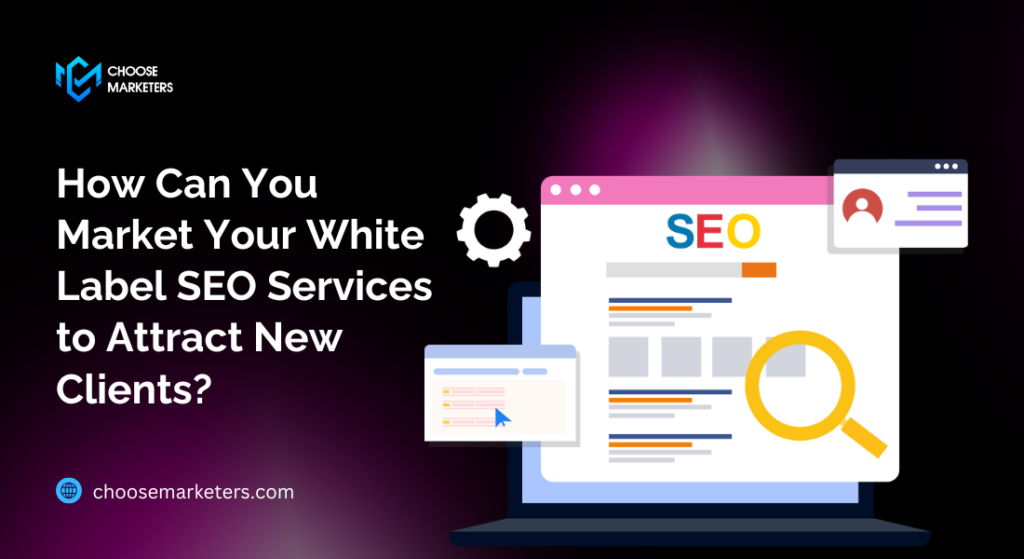

Why White Label SEO Is Crucial for Scaling Your Agency’s Success
White-label SEO is a strategic solution for marketing agencies aiming to provide SEO services without building an in-house team. Agencies partner with specialized. SEO providers who perform SEO tasks such as research, link building, on-page optimization, and reporting under the agency’s brand. This partnership allows agencies to offer comprehensive SEO services to clients, expand service offerings, and drive revenue without the need for additional staffing or technical expertise. SEO services agencies can focus on their core competencies, reduce operational costs, and meet client demand effectively. Agencies in the U.S., especially those in competitive markets, find white-label
SEO is beneficial as it enables them to scale SEO services quickly and improve profit margins. Benefits include access to up-to-date SEO practices, flexibility in scaling services based on client needs, and the ability to offer high-quality SEO outcomes that satisfy client objectives. With SEO being critical for online visibility, a white-label approach positions agencies as a one-stop solution for digital marketing, enhancing their competitive edge while maintaining client satisfaction and retention.
How Does Third-party SEO Work?
White-label SEO operates through a collaborative partnership between an agency and a specialized SEO provider. Here’s a breakdown of the process:
Selecting a White-Label SEO Provider: The first step is finding a reputable provider with a strong track record in SEO. Agencies should look for providers with expertise in essential SEO areas such as marketing research, on-page and technical optimization, and link building to ensure high-quality service delivery under the agency’s branding. It’s also critical to choose a provider with flexible service packages, transparent pricing, and proven results.
Onboarding and Setting Expectations: After selecting a provider, agencies establish service agreements and clarify roles. This phase is crucial for aligning expectations on deliverables, timelines, and communication methods. A well-structured onboarding process helps prevent misunderstandings and establishes a seamless client experience.
Service Fulfilment: The white-label provider handles all SEO tasks. They conduct marketing research, optimize client websites, build links, and generate reports—all under the agency’s brand. Agencies monitor progress and maintain regular communication with the provider to ensure alignment with the client’s SEO goals.
Managing Client Relationships: The agency remains the primary point of contact for the client, handling questions, setting expectations, and delivering results provided by the white-label team. By managing client communications, agencies maintain control of the client relationship, enhancing trust and loyalty.
Performance Monitoring and Reporting: High-quality third-party providers offer in-depth performance reports, showcasing key SEO metrics such as rankings, traffic improvements, and backlink growth. Agencies use these reports to demonstrate results to clients and refine strategies as needed, ensuring ongoing satisfaction and retention. Through these steps, outsourced SEO services enable agencies to offer robust SEO services without internal resources, effectively expanding service capabilities and meeting diverse client needs.
What Are the Benefits of White Label SEO?
White-label SEO offers significant advantages for agencies aiming to expand their service offerings. Here are the some benefits:
Scalability: White-label SEO allows agencies to grow their SEO services without the need to hire an in-house team. As client demand increases, the agency can scale services seamlessly through the provider, avoiding staffing constraints while maintaining service quality.
Cost Efficiency: Partnering with a white-label SEO provider minimizes overhead costs associated with recruiting, training, and managing an in-house SEO team. Agencies can access expert-level SEO at a fraction of the cost, preserving profitability while offering a full range of services.
Access to SEO Expertise: White-label providers bring specialized SEO knowledge and stay up-to-date with algorithm changes and industry trends. This expertise empowers agencies to offer advanced SEO strategies, ensuring client satisfaction and improved results.
Enhanced Focus on Core Business: By outsourcing SEO, agencies can focus on their core services, such as strategy development and client management. This division of labor enhances productivity and allows agencies to concentrate on strengthening client relationships.
Branding and Client Retention: With white-label SEO, agencies can present SEO work as their own, strengthening brand credibility. High-quality results foster client satisfaction, which in turn boosts client retention and positions the agency as a comprehensive marketing partner. Through scalability, cost savings, and access to SEO expertise, white-label SEO is a powerful tool that enables agencies to expand their offerings and deliver consistent, high-quality results.
How Do You Choose the Right Third-party SEO Partner?

Selecting the right this provider is essential for delivering effective results to clients while maintaining agency credibility. Here are the top criteria for choosing a reliable partner:
Proven Track Record and Experience: Look for providers with a successful history in white-label SEO. Examine case studies, client testimonials, and industry experience to gauge their effectiveness.
Comprehensive SEO Services: Ensure the provider covers all essential SEO tasks, including on-page optimization, marketing research, content creation, and link building. A full-service approach allows your agency to offer well-rounded SEO solutions to clients.
Transparent and Customized Reporting: High-quality white-label providers deliver regular, brandable reports that demonstrate SEO performance. Transparent, data-driven reporting is essential for presenting results and maintaining client trust.
Scalability and Flexibility: Choose a provider who can scale services as your agency grows and client demands increase. Flexibility in service options is also beneficial for catering to various client needs.
Communication and Support: A dependable white-label partner should offer responsive support and clear communication channels, enabling you to address client concerns promptly and maintain a smooth workflow.
White-Label Branding Capabilities: For a provider who allows you to brand SEO deliverables with your agency’s identity, helping you present the work as your own to clients.
How Do You Measure Success in White Label SEO?
Measuring the success of white-label SEO services is crucial to assess performance and demonstrate results to clients. Marketing metrics to track include:
Marketing Rankings: Monitoring the ranking position of target words over time is a fundamental metric. Higher rankings indicate that your SEO strategies are improving visibility, which can lead to increased organic traffic.
Organic Traffic: The volume of visitors arriving at the client’s website from search engines is a direct reflection of SEO performance. Consistent traffic growth signals that the website is reaching the right audience effectively.
Return on Investment (ROI): Measuring ROI helps determine the financial effectiveness of your SEO efforts. It involves comparing the costs of third-party SEO services with the revenue generated through increased traffic, leads, and conversions.
Conversion Rate: Tracking the percentage of website visitors who complete a desired action (e.g., form submission, purchase, or sign-up) helps assess the effectiveness of SEO in driving qualified leads.
Bounce Rate and Engagement Metrics: Low bounce rates and high engagement levels (e.g., time on site, page views per visit) suggest that the content is resonating with visitors and keeping them engaged, an important sign of SEO success.
Backlink Quality and Quantity: The number and quality of backlinks pointing to the website directly impact SEO success. Quality backlinks from authoritative sites can significantly improve domain authority and search rankings.
Technical SEO Health: Regular audits to track issues like broken links, site speed, mobile responsiveness, and crawl errors ensure that the website is optimized for both users and search engines.
Tracking these metrics will allow your agency to evaluate the effectiveness of your third-party SEO services, ensure continuous improvement, and present clear, actionable results to clients.
What Are the Core Services in Third-party SEO?
White-label SEO providers deliver a comprehensive range of SEO services that allow agencies to offer end-to-end solutions to clients. Here are the primary services involved:
Marketing Research
This foundational service involves identifying high-impact relevant to a client’s industry and audience. White-label providers conduct extensive marketing analysis to optimize content for search engine visibility and align with search intent.
On-Page Optimization
On-page SEO ensures that each webpage is optimized to rank highly. This includes tasks like optimizing title tags, meta descriptions, header tags, image alt text, and internal linking structures.
Content Creation and Optimization
Quality content is crucial for SEO success. White-label SEO providers create or optimize content that incorporates relevant keywords and resonates with the client’s audience, improving engagement and search engine rankings.
Technical SEO
Technical SEO enhances a website’s backend structure, addressing factors like site speed, mobile-friendliness, crawlability, and security. This ensures that search engines can efficiently index and rank the website.
Link Building
Link building focuses on acquiring high-quality backlinks from reputable websites. White-label providers build strategic links that increase domain authority, helping to boost rankings and traffic.
How Can You Market Your Third party SEO Services to Attract New Clients?

Effectively marketing your white-label SEO services is essential for attracting new clients and growing your agency. Here are strategies to promote these services:
Educate Your Target Audience: Use content marketing blogs, webinars, and guides—to explain white-label SEO and its benefits. Optimize your content for SEO-related keywords to rank higher in search results and attract businesses looking for SEO services.
Leverage Case Studies and Testimonials: Show the success stories of previous clients to build credibility and demonstrate the effectiveness of your SEO solutions. Positive feedback and tangible results from other businesses can act as powerful social proof.
Offer Free SEO Audits: Provide potential clients with a free website SEO audit, giving them a taste of the value you can bring. This not only attracts leads but also helps build trust and establish your expertise.
Engage on Social Media: Share SEO tips, success stories, and the benefits of white-label SEO on platforms like LinkedIn and Twitter. Social media can help position your agency as fan authority and attract new business.
Create Targeted Campaigns: Use paid search ads or LinkedIn outreach to target businesses in need of SEO services. Tailor campaigns to specific industries or company sizes, highlighting the advantages of white-label SEO.
Build Partnerships and Networks: Attend industry events, join SEO forums, and network with other marketing professionals. Establishing partnerships can open up new opportunities and referrals for your third-party SEO services.
What Are the Common Challenges with Third-Party SEO and How Can You Overcome Them?
While white-label SEO offers several benefits, there are challenges that agencies may encounter. Understanding these challenges and their solutions is crucial to maintaining smooth operations and client satisfaction.
Quality Control and Consistency
One of the most significant concerns with third-party SEO services is ensuring the quality and consistency of the work delivered by the provider. To mitigate this risk, choose a provider with transparent processes, conduct regular audits of their work, and maintain open communication to ensure expectations are met.
Communication Gaps
Lack of clear communication between the agency and the SEO provider can lead to misunderstandings and misaligned expectations. To solve this, establish a clear communication plan from the outset, including regular check-ins and reporting intervals. Utilizing project management tools can also streamline communication and keep both parties on the same page.
Client Perception of Outsourcing
Some clients may not fully understand the concept of third- party SEO and may prefer that the agency handle everything internally. To overcome this, agencies should educate clients on the benefits of outsourcing SEO to specialized experts while reassuring them that they maintain control over strategy and outcomes. Offering transparent reports and showcasing results will also help build trust.
SEO Provider Dependability
Relying on an external provider means agencies are dependent on their partner’s performance. To minimize the risk of poor service or delays, thoroughly vet potential providers before making a commitment. Sign clear service-level agreements (SLAs) that outline expectations for performance and timelines, ensuring that both parties are aligned on deliverables.
Keeping Up with SEO Changes
SEO is a constantly evolving field, and keeping up with algorithm updates and industry changes can be challenging. Work with a white-label provider that stays on top of these trends and integrates best practices into their strategies. Encourage continuous learning and offer feedback loops for optimization.
By proactively addressing these challenges, agencies can optimize their white-label SEO partnerships, ensuring smooth workflows, client satisfaction, and long-term success.
Commonly Asked Questions (AQs) about White Label SEO
- What is White Label SEO?
White-label SEO is when an agency outsources SEO services to a provider who performs the work on their behalf. The agency then presents the results under its own branding, allowing them to offer SEO services without needing in-house expertise.
- How Does White Label SEO Benefit My Agency?
Third-party SEO services enable agencies to expand their service offerings, reduce overhead costs, and access advanced SEO expertise without hiring full-time specialists. It’s a scalable solution that supports business growth.
- What Services Are Included in White Label SEO?
White-label SEO typically includes keyword research, on-page optimization, technical SEO, content creation, link building, and performance tracking. These services are designed to improve search engine rankings and drive organic traffic.
- How Do I Choose a White Label SEO Partner?
Look for a provider with a proven track record, a comprehensive range of SEO services, transparent reporting, scalability, and excellent communication. Consider their ability to customize strategies for your clients’ specific needs.
- Can I Brand the SEO Services as My Own?
Yes, one of its benefits is that the provider performs the work behind the scenes, allowing you to present the services and results under your own branding, maintaining your agency’s identity.

